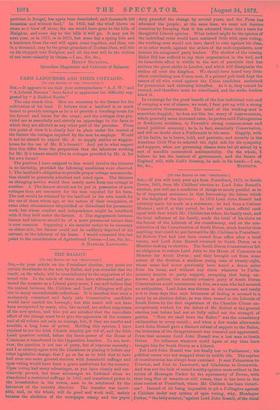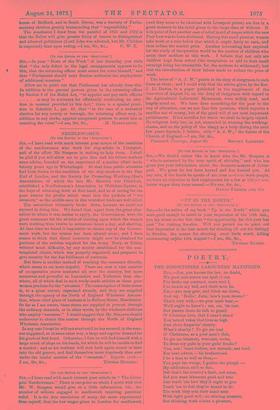[TO THE EDITOR OP THB " SPECTATOR:1 SIR, —If you
will turn your eye from Pontefract, 1872, to South. Devon, 1835, from Mr. Childers' election to Lord John Russell's election, you will see a condition of things so nearly parallel as to. be of important assistance in that forecasting the future which is the delight of the Spectator. In 1835 Lord John Russell had certainly made his mark as a statesman ; he had been a Cabinet. Minister ; and if, at that period, he had not taken official rank equal with that which Mr. Childers has taken, his family rank, and' the local influence of his family, made the total of his claim on. the favour of the Liberals of the constituency, and on the con- sideration of the Conservatives of South Devon, much heavier than anything that could be put forward for Mr. Childers in Pontefract. Sir Robert Peel had just been ousted from office after a brief tenure, and Lord John Russell returned to South Devon as a. Minister seeking re-election. The South Devon Conservatives felt no obligation to restore Lord John to the House of Commons as Member for South Devon ; and they brought out from some corner of the division a studious young man of twenty-eight, whose name had never previously been heard a dozen miles. from his home, and without any claim whatever to Parlia- mentary honour or party support, excepting that being un- known in politics, the scarcely cohesive party of Smith Devon. Conservatives could concentrate on him, as a man who had aroused. no antipathies. Lord John was thrown in the contest, and rarely is it in these days that such bitterness of feeling is aroused in a party by an election-defeat, as was then roused in the Liberals of South Devon by the first experience of the Chandos Clause un- scrupulously worked, for the defeat of. Mr. Bulteel at the general election just before had not so fully called out the strength of parties. "Now we shall have the Ballot!" was the consolatory exclamation in every mouth; and when a few weeks afterwards Lord John Russell gave a distinct refusal of support to the Ballot, the bitterness of the disappointment was renewed and aggravated.. From that moment Lord John Russell was a lost man to South Devon. No influence whatever could again at any time have- brought him for South Devon as a Liberal.
Yet Lord John Russell was not finally lost to Parliament ; his.
political career was not snapped short in middle life. The caprice of constituencies has always been exercised. It sent Palmerston to- Tiverton, and Peel to Tamworth, and Gladstone to Greenwich. And was not the lack of sound healthy opinion more evident in the. return of Montague Parker by the squirearchy of Devon, with their long files of tenants-at-will voters, than it has been in the. close contest at Pontefract, where Mr. Childers has been victori- ous ? Instead of its being impossible to pit a Pollington against a Childers under any system of open voting, why, Montague Parker, "the babysenator,"against Lord John Russell, of the ducal- house of Bedford, and in South Devon, was a travesty of Parlia- mentary election greatly transcending that "impossibility."
The conclusion I draw from the parallel of 1835 and 1872 is that the Ballot will give greater fixity of tenure to distinguished and admired politicians (Lord John was admired, but Mr. Childers is respected) than open voting.—I am, Sir, &c., C. W. E.



































 Previous page
Previous page